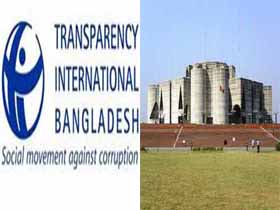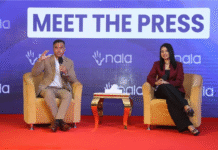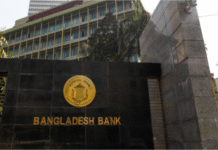It is only the quorum crisis that claimed 222 hours and 36 minutes of the sessions of the ninth parliament causing a wastage of about Tk 104 crore of public money, according to a new study conducted by the Transparency International Bangladesh (TIB).
The study estimated that about Tk 78,000 is needed to conduct per minute of parliament session while about Tk 24 lakh wasted in every working day of the ninth parliament.
The TIB revealed the study, titled ‘Parliament Watch’, on the operation of the 9th parliament at a press conference at Cirdap auditorium in the capital on Tuesday.
TIB programme manger (research and policy) Juliet Rosette and deputy programme manger Morsheda Akhter jointly presented the findings of the study at the press conference.
The study shows that the main opposition of the 9th parliament had boycotted 82 percent of the parliamentary working time from January 2009 to November 2013.
About the parliament boycott by the main opposition, the study said the opposition party had made a record of parliament boycott being present at parliament only by 2.30 percent time of the total working sessions, the economic value of which is Tk 4.87 crore.
It found that the participation of businessmen has increased to 57 percent in the ninth parliament while it was only 17 percent in the first parliament of the country.
Referring to the positive sign of the ninth parliament, the TIB study revealed that the attendance of parliament members had increased by 63 percent in the ninth parliament than the eighth parliament.
The study put forward a set of recommendations aiming to make parliament effective and accountable and strengthen democracy.
The recommendations included formulation of a new act to stop parliament boycott, introducing parliamentary calendar, taking steps to finalise the ‘Code of Conduct of Parliament Members 2010’ and holding referendum on issues of national interests, including amendment to the constitution.
TIB trustee board member and former adviser to the caretaker government M Hafizuddin Khan said the national parliament could not be made effective for lack of political will of political parties.
“There’s no alternative to having a strong opposition party to make parliament effective. Good governance could be established in the country by making parliament a centre of discussion,” he said.
TIB executive director Dr Iftekharuzzman, its deputy executive director Dr Sumaiya Khair and director ((research and policy) Rafiqul Hasan were present at the press conference.
Source: UNBConnect










